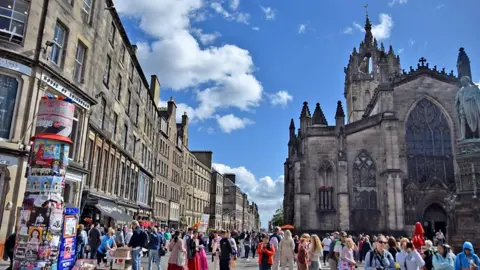Could Edinburgh be the next European city to charge a tourist tax?
 BBC
BBCEdinburgh Council has been pushing for a tourist tax in Scotland, saying a £1 a night bed charge could generate £11m a year for the city. Other Scottish councils, including Highlands and Aberdeen City, are also keen. But will it happen? Here are some key questions and answers.

What is a tourism tax?
Tourism tax, also known as an occupancy or bed tax, is a levy that is usually charged per person, per night.
It is on-top of the cost of a holiday, and is paid directly by guests to hotels, B&Bs, and campsites.
The rate typically varies by the standard of accommodation, location and local authority, and children often attract reduced rates or are exempt.
The money raised is usually used to help protect the environment, pay for infrastructure, or promote tourism.
There is no such tax currently in the UK, and the idea has attracted opposition from business. A survey by the Federation of Small Businesses found three-quarters of respondents were against the tax, with fears it will put tourists off.
That's not the view of Airbnb in Edinburgh which backs the move.
Which countries have one already?
About two-thirds of EU member states currently impose occupancy taxes on visitors - the exceptions being Cyprus, Denmark, Estonia, Finland, Ireland, Latvia, Luxemburg, Sweden and the UK.
Some levies are country-wide, and some are contained to cities, or areas.
- Austria - Tourists have to pay an overnight accommodation tax, including at campsites. They vary between areas, but start at 13p per night. Visitors to Vienna and Salzburg have to pay 3.02% of the price of the room per night. Under 15s are exempt
- Belgium - Hotels in Antwerp, Bruges, and Ghent charge anything between £1.78 per night, and £2.22 per night. Campsites are much less. Brussels has a complicated formula for working out the tax, but it is generally more expensive than the other cities. Under 12s are exempt.
- Bulgaria - There is either a Resort or Hotel tax, which can be per person per night (between 44p and and £1.34), or per person, per stay. They range in price between regions and hotels.
- Croatia - Over 18s have to pay a "Sojourn Tax" of between 24p and 83p per person per night, depending on the season, the hotel type, and the area. Under 12s are exempt, and there's a 50% discount for those aged 12 to 18.
- Czech Republic - Prague charges 52p per person, per night.
- France - The tax varies between 17p and £3.49 per person, per night, depending on the type of accommodation. Paris adds 10% to its charges. Under 18s are exempt.
- Germany - Some cities do (Hamburg, Berlin), and some do not (Munich). Of the ones that do, again the price varies, ranging from 44p to 5% of the room bill.
- Greece - Introduced in 2018, prices vary on the basis of accommodation type. They range from 44p to £3.49 per person, per night.
- Hungary - Budapest charges 4% of the price of the room, per night.
- Italy - Charges in Italy vary widely between cities, with differing exemptions. In Rome, visitors to a 5* hotel can expect to pay £6.11 per person, per night. Under 10s are exempt in the city.
- Netherlands - Again, many variations across the country, but most areas do charge. A hotel in a popular tourist area of Amsterdam, for example, will charge 5.5% of the room price.
- Portugal - Lisbon and Porto charge a tourist tax. The capital charges £0.89 per person, per night. It is double that in Porto.
- Romania - There's a 1% charge on the accommodation cost, but in resorts it only applies for the first night. Under 18s are exempt.
- Slovenia - Ranges between 52p and £2.09 per person per night. Under seven are generally exempt.
- Spain - Charges are applied in the Balearic Islands (Majorca, Minorca, Ibiza, Formentera, and Cabrera) and Catalonia. Barcelona has more than 30 million visitors a year, and has a tax of between 39p and £1.96 per person, per night, for the first seven nights.
- Switzerland - The cost varies between areas and hotel types, but averages out at around £1.85 per person, per night.
There are also charges in other part of the world, including the United Arab Emirates, and the USA. Barbados introduced a levy this summer.
Why could it happen in Edinburgh?
The number of people visiting Edinburgh continues to rise. In the last five years, visitor numbers increased by 18% to 3.85 million.
In a city of 489,000 residents, that's a lot of extra people to try and avoid on the pavements.
Edinburgh has long advocated a levy for the capital, where visitors are estimated to spend nearly £1.5bn a year, supporting about 34,800 jobs.
As far back as 2011, councillors agreed in principle to a tourism tax plan, but establishing such a power would require an act of the Scottish Parliament.
The Scottish government has remained lukewarm about the idea of taxing visitors.
However, there has been speculation that a levy of this type could potentially become a bargaining chip of the government's as it seeks the support of the Scottish Greens for its forthcoming budget.
Where else in Scotland is in favour?
Areas which have a lot of tourists, including Highland, Argyll, and Aberdeen.
Highland has six million annual visitors, with well documented pressures on roads in places like Skye, as well as parking problems near the Glenfinnan Viaduct.
